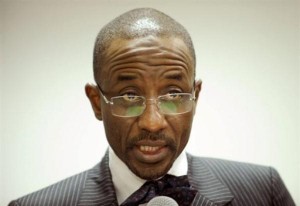CBN Cautions National Assembly on Oil Benchmark Increase, Retains Interest Rate At 12%
The Monetary Policy Committee of the Central Bank of Nigeria on Tuesday advised the National Assembly not to increase the 2013 budget oil benchmark from $75 to $80 per barrel.
The CBN Governor, Mr. Lamido Sanusi said, such a parameter of the budget should not be subjected to political manipulations. He made this remark while addressing journalists at the end of the committee’s meeting held at the bank’s headquarters in Abuja.
The oil price benchmark has continued to be a seriously debated issue, full of controversy between the National Assembly and the Executive.
It could be remembered that President Goodluck Jonathan proposed a $75 per barrel price benchmark.
On the contrary, the National Assembly refused the proposal and decided to adopt the benchmarks of $78 and $80 per barrel, respectively.
In their arguments, the executives maintained that a conservative oil benchmark would help to guarantee more savings for the future, while the National Assembly members pointed out that increasing the benchmark would help the country reduce its fiscal deficit to a manageable level.
However, Sanusi called on both parties to take a cue from the Chilean experience and work things out.
He said, “On the oil price benchmark used in the 2013 budget, the MPC reaffirmed its support for maintaining the $75 per barrel proposed by the fiscal authorities and noted that this has become even more critical in light of evidence that output projections may have been overly optimistic.
“In this regard, the committee called on the government and the National Assembly, going forward, to borrow from the Chilean experience with regard to the setting of the parameters for the preparation of the national budget to avoid the perennial rancour between the Executive and the legislature on benchmark oil price.
“Specifically, the committee called for the setting up of an independent legal structure that will set the benchmark output and price underpinned by the long term trajectory of output and price, by independent experts who are shielded from political interference and interests.”
Sanusi said the committee also called on the government to considerably boost capital spending and perk up good governance and transparency in the public service.
He added that the committee, with an undivided vote, resolved to leave the Monetary Policy Rate unchanged at 12 per cent with a corridor of +/- 200 basis points around the midpoint.
Also retained were the Cash Reserve Ratio at 12 per cent and the Liquidity Ratio at 30 per cent.
In arriving at the decision, Sanusi said the committee was faced with three options.
“The committee considered and rejected option one as being potentially pro-cyclical, considering the structural nature of recent inflationary pressures. While acknowledging the merit of the arguments in favour of option two, it was also rejected as likely to send wrong signals of a premature termination of an appropriately tight monetary stance,” he said.









